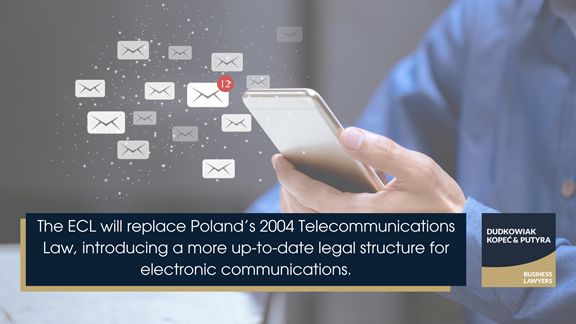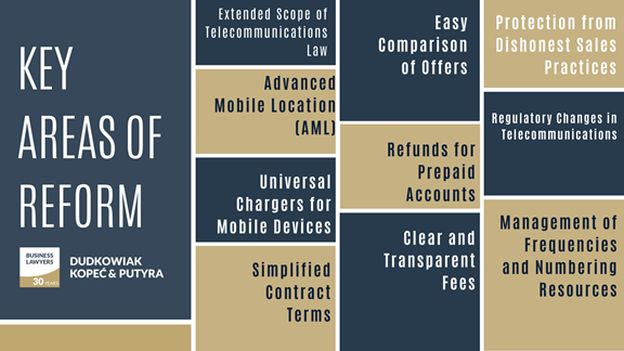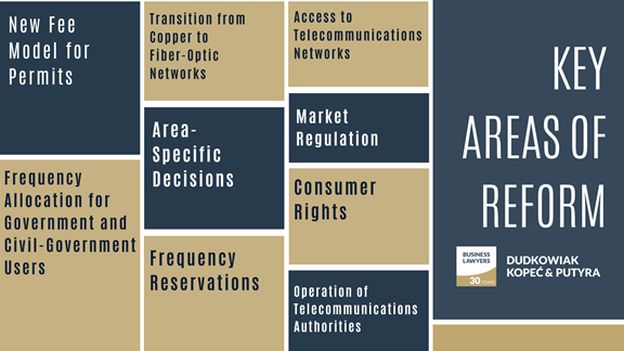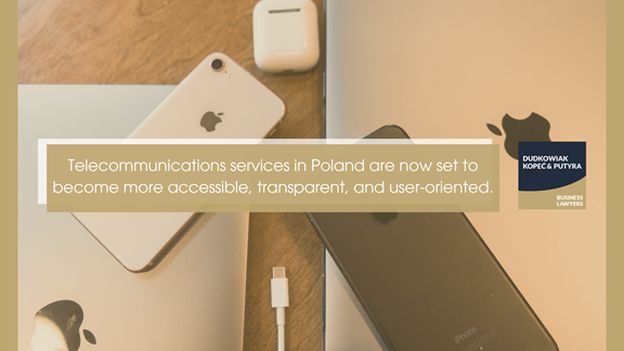- within Media, Telecoms, IT and Entertainment topic(s)
- in United States
- with readers working within the Telecomms industries
- within Media, Telecoms, IT and Entertainment topic(s)
- in United States
- with readers working within the Media & Information and Telecomms industries
- within Media, Telecoms, IT, Entertainment, Employment and HR and Corporate/Commercial Law topic(s)
Key Changes Introduced by the New Electronic Communications Law
Poland has officially published the Electronic Communications Law (ECL) in its Journal of Laws, marking a significant step towards harmonizing the country's legal framework with European Union standards.
This law implements two crucial EU directives into Polish legislation: Directive 2018/1972 of December 11, 2018, which introduces the European Electronic Communications Code (EECC), and Directive 2022/2380 of November 23, 2022, which amends Directive 2014/53/EU concerning the harmonization of regulations for marketing radio equipment across member states.

The ECL will replace Poland's 2004 Telecommunications Law, introducing a more up-to-date legal structure for electronic communications. The Electronic Communications Law (PKE) aims to enhance consumer rights and improve their interactions with telecommunications service providers. The new regulations target several critical areas, increasing both the quality and transparency of telecommunications services.
Implications for Consumers
The Electronic Communications Law offers several benefits to consumers, including:
- Enhanced transparency: Consumers will find it easier to compare offers and select the most advantageous ones.
- Improved protection: The law offers increased protection against dishonest vendors.
- Prepaid refunds: Users of prepaid services will be able to reclaim unused funds after ceasing to use the service.
- Greater safety: The Advanced Mobile Location (AML) service will enable the precise location of individuals calling emergency numbers.
- Reduction of electronic waste: Common chargers for electronic devices will reduce waste and help consumers save money.
Entry Into Force of New Telecom Law in Poland
Most of the provisions of the Electronic Communications Law will come into effect on November 10, 2024, three months after its publication in the Journal of Laws on August 9, 2024. However, certain provisions will have delayed implementation, with some coming into force immediately after publication, and others up to 12 months later, depending on the specific regulations involved.

Key Areas of Reform
Extended Scope of Telecommunications Law
The new Electronic Communications Law significantly broadens the range of services it governs. Beyond traditional telecommunications companies, the law now extends to online communication providers, including those offering services like email, messaging apps, and audio or video communication tools.
As a result, more types of businesses will be subject to these updated regulations, expanding the law's coverage well beyond the realm of conventional telecom operators.
Advanced Mobile Location (AML)
The legislation introduces Advanced Mobile Location (AML), which will provide precise location information for individuals calling emergency services (112 and other three-digit emergency numbers). This enhancement will significantly improve response times for emergency services.
Universal Chargers for Mobile Devices
Under the new rules, mobile devices will be compatible with universal chargers, reducing electronic waste and saving consumers money. Devices may be sold with or without a charger, with clear labeling explaining how to charge the device properly. Pictograms on the packaging will indicate whether a charger is included with the product.
Simplified Contract Terms
Telecommunications providers will be required to clearly communicate contract terms to consumers before they sign. This ensures that customers are fully informed and can make deliberate decisions regarding the most suitable offers.
Easy Comparison of Offers
The new regulations make it easier for consumers to compare various telecommunications services, helping them to find the best deals on the market.
Refunds for Prepaid Accounts
Prepaid service users will be entitled to claim unused funds when they discontinue using the service. This enhances consumer protection by safeguarding their financial interests.
Clear and Transparent Fees
The PKE introduces transparent fee structures, ensuring operators cannot impose hidden or unjustified charges for additional services. This transparency will build greater trust between consumers and service providers.
Protection from Dishonest Sales Practices
The law strengthens protections against unscrupulous vendors of telecommunications services, especially those who attempt to sell services at customers' homes without prior appointments.
Regulatory Changes in Telecommunications
The PKE will regulate several key aspects of the telecommunications sector, including:
- Business registration requirements for telecommunications businesses and local government units.
- Information obligations regarding network and service security, as well as state security.
- New fee structures for entities operating in the telecommunications sector.
Management of Frequencies and Numbering Resources
The law establishes new rules for managing frequency allocations and numbering resources, including conditions for allocating, modifying, and renewing frequency reservations, as well as obtaining radio permits. These regulations also cover procedures for selection processes overseen by the President of the Office of Electronic Communications (UKE).

Access to Telecommunications Networks
The President of UKE will have the authority to issue area-specific decisions regulating access to telecommunications networks. These decisions will replace individual permits and cover broader geographical regions.
Market Regulation
The law outlines procedures for conducting market analyses, imposing regulatory obligations, and managing wholesale and retail markets. It also addresses investment conditions, regulatory accounting, and cost calculations.
Consumer Rights
The PKE establishes detailed rules for contract formation and termination, service complaints, and consumer access to independent tools for comparing service offers. It also includes provisions on direct billing services.
Operation of Telecommunications Authorities
The legislation also addresses the functioning of national telecommunications authorities responsible for overseeing the electronic communications sector.
Transition from Copper to Fiber-Optic Networks
New incentives will be offered to operators that replace outdated copper infrastructure with modern fiber-optic networks. These provisions are designed to foster healthy competition while ensuring that current users' rights are protected during the transition.
Area-Specific Decisions
Under the new law, area-specific decisions will replace individual decisions previously issued by the President of UKE. These area decisions will apply to defined regions and set general conditions rather than focusing on individual companies.
Frequency Reservations
Frequencies for broadband systems will be reserved for periods ranging from 15 to 20 years, providing stability for rights holders. These reservations can be extended by up to 5 years, but the total duration cannot exceed 20 years.
Frequency Allocation for Government and Civil-Government Users
The Ministry of National Defense will manage frequency allocations for government users, while the President of UKE will oversee allocations for civil-government users.
New Fee Model for Permits
The PKE introduces a new fee model for issuing permits, replacing the previous administrative fee system. The President of UKE will now collect the fees, with a portion of the fees for base stations being directed to the local municipality where the station is located.
Empowering Poland's Digital Future
Poland's new electronic communications law is a major stride toward modernizing the nation's digital infrastructure, offering clear advantages for consumers, businesses, and the environment.
With streamlined contract terms, universal chargers, and simplified offer comparisons, this law promotes convenience and cost savings while helping to cut electronic waste. Telecommunications services in Poland are now set to become more accessible, transparent, and user-oriented.

The content of this article is intended to provide a general guide to the subject matter. Specialist advice should be sought about your specific circumstances.


